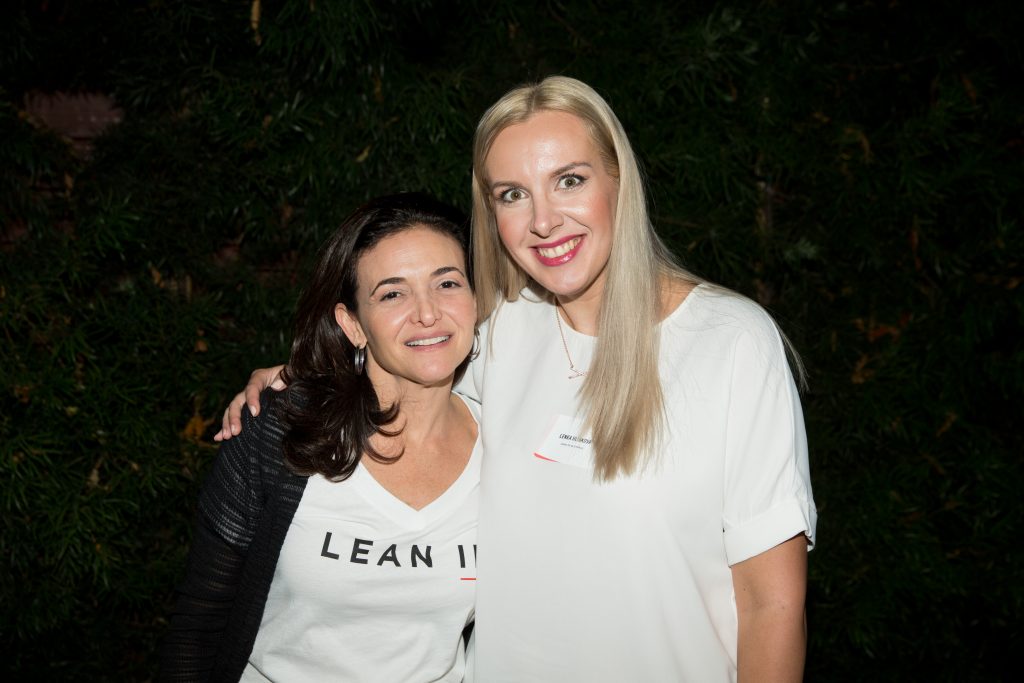 Slovakia
Slovakia
Lenka Hlinkova – LEAN IN Slovakia Director, Published Author…
Lenka you have tons of experiences under your belt. Could you walk us through your CV?
Sure. My road to Information Technology didn’t go through informatics, I studied economy. However, I have always been a mathematics and data lover and have been drawn to the digital world since my early age. Beside my university studies, I started working in an IT company and also kicked off my first online business. Selling shoes and sunglasses earned me my first own car when I was 25.

Soon I joined a start-up with two smart blokes who built an e-commerce platform for selling fashion online in our country from various European e-shops with a single check out. After 2 years we realized it won’t pay our salaries and I got a job in telco as a Project Manager with a team of 17 people and travelled quite often to the UK. I started dreaming about relocation but also wanted to focus more on software development. After 9 months of sending hundreds of CVs I finally got the right offer and moved to London with my husband, where we worked for almost 2 years and it is still the best life and work experience of my life. Once we started planning a family, we decided to move back to Kosice, our hometown, and got jobs at a FinTech flagship company. I dived into Business Analysis, learnt programming basics and continued developing my leadership skills. One year after my daughter was born I got back to work part-time and picked up a UX project. In my spare time I started developing websites on my own and when I got pregnant again, I knew there is no point for me to get back to work because I was able to earn a living on my own. Soon I co-founded Selfactory, later renamed to Algoritmus. Since my son’s birth, I have been dividing my working time between business and non-profit activities.
You are the National Founder and Leader of the LEAN IN Network in Slovakia, a community of women empowering each other to build successful and purposeful careers. Could you tell us why you decided to found this initiative in Slovakia and share with us a little bit more about the programme?
Four years ago I read the book LEAN IN, Women, Work and the Will to Lead, written by Sheryl Sandberg, the Chief Operating Officer of Facebook. This book touched me so deeply. There were so many “yes” moments. When I googled more about the book I found out that the global initiative Lean In was on a rise. Lean In is community of women who meet in circles to deal with their biggest challenges together. And with my former colleague, we started our first Lean In circle in Kosice. Later, we inspired others to found new ones. I created a network to keep us together, that was noticed and appreciated by the Lean In programme management, who offered me the opportunity to become a network leader in Slovakia. Soon after that, I was invited to San Francisco to meet with other 120 leaders from around the world and as a part of the conference, we spent dinner at Sheryl’s house and met her in person. The whole program aims to help women achieve their full potential. Whether by removing internal or external barriers, we support women at work by educating them, building new circles and assisting companies with creating inclusive working environments. Currently there are 32 circles in Slovakia and 50 thousands globally.

Source: Archive of Lenka Hlinková
” Women earn 19,4% less than men throughout all industries in Slovakia. We should start asking for what we deserve.”
Lenka Hlinková
You are also the co-founder and managing director of Algoritmus (former Selfactory), that’s been helping people hungry to gain new skills and experience for 2 years. What led you to found this initiative?

For the third year I work as a Google Certified Trainer (specializing on Digital Security) and have already trained more than 1000 Slovaks in various digital skills, soft-skills or diversity and inclusion related topics.
With the former co-founder, who was a full stack developer we started working on websites with interns, providing them their first working experience. We continue in these internships beside training programs. The reason behind this was very natural. I wanted to do more than write a book to help women or generally people to work in Tech, even if they missed the opportunity to study computer science.
Next to all of your projects and work, you have also managed to write a book Ženský algoritmus. I read on your Linkedin that it took you over 18 months to write the book and another 12 months to have it published. Why did you decide to dedicate this time to publish this fantastic book?
The book was triggered by my own curiosity. I made some private research on why there are so few women in Tech, about how our brain capacity compares to men’s, what obstacles women in STEM have to overcome, and my favorite part was statistics. I gathered figures to see the percentage of women and generally people employed in Tech in Slovakia in comparison to the EU (based on it only 4 percent of our workforce is technically oriented). I looked at how much they earn, and how women’s and men’s salaries differ in the same positions (we earn less in all sectors). I have been dealing with this topic for a long time, but it took me two and a half years to complete it, including collaboration with the publisher. While writing, I read about 60 books, hundreds of articles, and surveyed my former Slovak and English female colleagues. The facts in the book were enriched with my own stories and experiences. I was convinced that this topic could be of interest to other women, and the Slovak best-books publisher, as they promote themselves, gave my manuscript a chance.
Where do you find the motivation to keep on working on all of your projects?
I have a very strong WHY. Whoever has read the book Start with Whyby Simon Sinek knows what I am talking about. I am personally convinced that women need to be equally represented at the tables where important decisions are made with the impact on the whole society. Women are a half of the society, we should co-decide about it. Politics, technology and corporate boards are such places and I wish to see more women there soon. Although it is a complex goal, the best way to change the world is to start with my city, my country and that sounds achievable.
We are in the middle of a pandemic, with isolation and being apart from our friends, colleagues, family. How do you keep yourself going and working?
I fully adapted to this, our business thrives during this pandemic because so many people realise they lack technical skills or their business’ lack online presence and eventually see the advantage of working flexibility in the tech sector. I admit, sometimes it is very difficult. We work both from home and during the lockdown, It was (and is) very difficult with two little kids (2 and 4 years old). Very often I work at nights and on weekends so that I can be with my family during the day. I have a great team of 14 people who are amazing, capable, supportive and professional. I feel responsible to keep the business going whatever the circumstances.
You seem to be working on a lot of great projects, how do you find the time to work on all of them. Perhaps you can give some advice to our readers on how to handle their schedules when they are working simultaneously on more projects?
Not sure if I am the best person, because even after years of experience, I sometimes end up with realizing I took too much on. But what usually helps me is a good prioritisation, ability to distinguish what is just urgent and what is really important and solid decision making. Second, I try to leverage technology as much as possible and anything we can automate we try to automate. And I realise we wouldn’t be where we are without such a great team. I invest time and money in developing the right people and I enjoy it.
When it comes to working on simultaneous projects, that’s one of the things I have learned about myself – that I simply can’t work on one single thing. I enjoy switching between stuff. Here, I am fully aligned with Nora Roberts, a mom, professor and novelist who replied on how she can handle it all with “the key to juggling is to know that some of the balls you have in the air are made of plastic and some are made of glass.” I know my values.
As a woman who is strongly involved in female empowerment in Slovakia, you have probably a great overview on position of women in different industries in Slovakia. How do you see the current situation?
Currently women hold only 14% in ICT positions that pushes us to last positions in the European Union. Bulgaria and Romania have 30% and it is a showcase of what is achievable (at least). Women earn 19,4% less than men throughout all industries in Slovakia. We should start asking for what we deserve. 20% executive roles are held by women. It is again a more complex topic, as there is not always a barrier from the side of the employer for women to succeed. Partially, it is a social construct that women should be the only ones taking care of the household and families, taking maternity leave etc. Also, the other social expectations and last but not least, our own low self confidence. The situation is getting better, but too slowly. Paraphrasing Hillary Clinton, women are still the largest untapped reservoir of talent in the world – including Slovakia.
We need more men taking parental leave, higher self confidence and more female role models.
What is your number one advice for girls and women who are not sure how or if they should follow their dreams?
In order to follow your dreams you need to know them first. We surveyed Slovak women last year and found out that a majority of them do not know their strengths or how to develop them. Therefore, my number one advice is – know yourself, ask yourself what you want to do, what brings you joy and which activities lead you to flow – a state where you forget the world around you. And find your why. It should be strong enough to keep you motivated even if things go wrong. And accept the failures in your life as a natural side effect of your effort. Instead of being hit by them, build stairs out of each to step up.
Many women at the moment can feel overwhelmed by the current situation, and they might not feel like pursuing their dreams. What would you like to say to these women?
Believe in yourself. Share household chores and family responsibilities with your partner. Stay united. We can get through this together. And we will.









